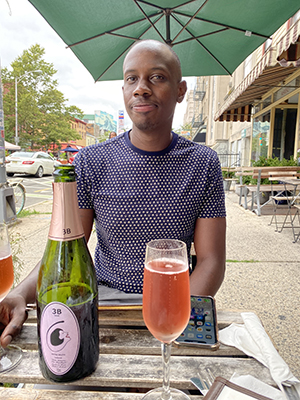One ubiquitous effect of the pandemic has been forced self-reflection. In this fraught landscape and constant uncertainty, this has proven true for parents, doctors, small-business owners — you name it. It’s perhaps most profoundly true for those in the hospitality industry. With so many employees having been laid off, and so many more demands being made on the managers who are still working, people in the industry have had to take a hard look at themselves and ask some very tough questions. How do we pivot to meet the needs of today, let alone tomorrow? How do we prioritize our family? Our careers? Ourselves?
In a field notorious for its demanding lifestyle, new approaches and new outlooks are forming, and many thought leaders are encouraging those in the beverage community to begin conversations around the importance of making time for self-care, and the pursuit of a balanced way of life. The benefits of these practices are numerous, extending beyond the individual. They lead to stronger teams, a more unified staff, and, frankly, a more profitable business.
“With many restaurants, you get razor-thin margins, overworked staff and a host of other problems, which creates an unstable environment, fiscally and emotionally, for the business and employees,” said Jen Estevez, founder and CEO of OMVino, a creative marketing and communications agency. “Employees are so used to constantly being in service of others that it can lead to not putting themselves first when they most need to. When one puts themselves first all the time, yes, that is being selfish, but putting yourself first when you need to is called self-care and balance.”
After years of working at top restaurants around San Francisco, including Michael Mina, Epic Steak, Keiko and Nob Hill — the last two as wine director — Estevez moved off the floor to open her company, while also consulting for restaurants.
 Photo: Jen Estevez, founder and CEO of OMVino.
Photo: Jen Estevez, founder and CEO of OMVino.
“I hit burnout a couple of times before I really learned my lesson,” she said. “I decided to skip taking my Master Sommelier exam for a third time, as I had never been that tired in my life. I was neglecting myself and knew I would not be able to sustain my company's growth. So I went to Rishikesh, India, for a 6-week sabbatical where I mostly didn't work, and did three hours of yoga per day, plus mediation, and breathwork. It was pretty life changing, I never forgot what I learned there and made new healthy habits: You should do something for yourself each day, even if it is small. Prioritize it. Whether that thing is yoga, meditation, taking a walk on the beach or playing guitar, do something healthy for yourself every day. Set aside one hour, and if you can't set aside one hour, set aside whatever time you can.”
In New York City, Sylvester Inda spent six years working services at Keens Steakhouse (he has recently moved to working in wine retail), and had a similar path to awareness of his limits.
“I was literally working all the time, and the hours, especially for management, are long and demanding. And after their shifts, restaurant workers are notoriously known for going to grab a drink, or two, or three, to celebrate a successful service, even knowing that they may have to be back to open the next morning. I was exhausted and not where I knew I needed to be at the start of service,” Inda said.
In addition to the often destructive post-work lifestyle, many restaurant cultures also cultivate an environment that scorns anyone who wants, or needs, to take personal time. In fact, it’s often a badge of honor to note how many successive days one has gone without a day off.
 Photo: Sylvester Inda
Photo: Sylvester Inda
“This needs to change,” Inda said. “Beverage professionals need to stop neglecting their physical and mental health. And we need leaders who encourage this type of thinking. We can only give the best of ourselves to our customers, and our work, when we are the very best versions of ourselves. For me, setting some type of fitness goal and sticking to it keeps me focused and energetic. When your mind and body are in sync, it radiates positive energy that a guest can feel at a table. How the guest is doing is important, but how your workers are doing mentally and physically is what really drives your business.”
To help him form strong habits, Inda formed a running club with his fellow hospitality professionals, which not only encouraged exercise, but also created a community that valued positivity.
Changing bad habits and starting on the path to wellness and self-care begins with small steps. “You have 1,440 minutes in each day, so start by scheduling just six minutes for yourself each day, without distractions,” said Kat Thomas, a long-time beverage professional based in Las Vegas, who formed CORE Body | Mind in April 2020 to consult and mentor those in the hospitality space by offering yoga, meditation and motivational training. She has seen a big increase in the number of colleagues having vulnerable conversations around wellness, and who are beginning to discuss their personal challenges openly — something that was simply kept private in the past.

Kat Thomas, a long-time beverage professional based in Las Vegas, who formed CORE Body | Mind in April 2020.
“There’s been a lot of introspection, especially for those without work now,” Thomas said. “You see it on social media now. People are talking and asking for help. I advise them to start with an easy approach to physical health and slowly build on it. When we help ourselves, we are more capable and recharged to help others. And for owners and managers, it's about encouraging a sense of community among their employees, and making it a strength to ask for help when needed.”
Much cultural change, and immediate change, for that matter, can take place when simple practices are implemented by the management team of a restaurant, and followed consistently.
“Staff depend on leadership to stay motivated, provide support and give constructive feedback and praise,” Estevez said. “Employees need to feel valued and heard. Having a healthy communication system where people feel like they can connect with their management if there is an issue is crucial. It's also important that staff regularly receive both praise and constructive feedback. Praise allows people to feel valued, and they work harder and with more enthusiasm. Feedback allows people to grow and learn. When leadership has good rapport with employees by behaving in this way, employees are more likely to speak up when they see opportunities for the business to improve.”
David Flaherty has more than 20 years of experience in the hospitality industry. He is a certified specialist of wine, a certified cicerone and a former operations manager and beer and spirits director for Hearth restaurant and the Terroir wine bars in New York City. He is currently marketing director for the Washington State Wine Commission and writes about wine, beer and spirits in his blog, Grapes and Grains.





